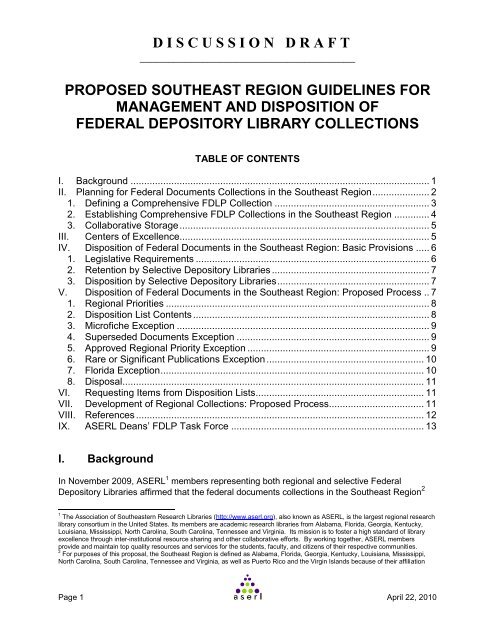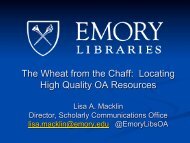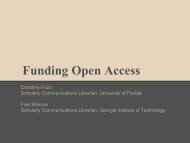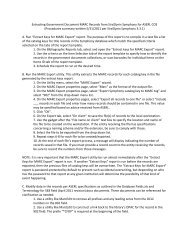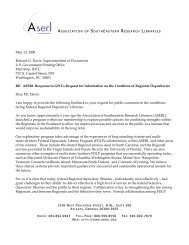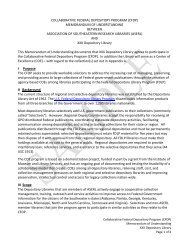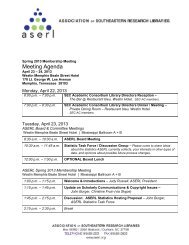PROPOSED ASERL GUIDELINES FOR - Association of ...
PROPOSED ASERL GUIDELINES FOR - Association of ...
PROPOSED ASERL GUIDELINES FOR - Association of ...
Create successful ePaper yourself
Turn your PDF publications into a flip-book with our unique Google optimized e-Paper software.
D I S C U S S I O N D R A F T<br />
______________________________________<br />
<strong>PROPOSED</strong> SOUTHEAST REGION <strong>GUIDELINES</strong> <strong>FOR</strong><br />
MANAGEMENT AND DISPOSITION OF<br />
FEDERAL DEPOSITORY LIBRARY COLLECTIONS<br />
TABLE OF CONTENTS<br />
I. Background .............................................................................................................. 1<br />
II. Planning for Federal Documents Collections in the Southeast Region ..................... 2<br />
1. Defining a Comprehensive FDLP Collection ......................................................... 3<br />
2. Establishing Comprehensive FDLP Collections in the Southeast Region ............. 4<br />
3. Collaborative Storage ............................................................................................ 5<br />
III. Centers <strong>of</strong> Excellence............................................................................................ 5<br />
IV. Disposition <strong>of</strong> Federal Documents in the Southeast Region: Basic Provisions ..... 6<br />
1. Legislative Requirements ...................................................................................... 6<br />
2. Retention by Selective Depository Libraries .......................................................... 7<br />
3. Disposition by Selective Depository Libraries ........................................................ 7<br />
V. Disposition <strong>of</strong> Federal Documents in the Southeast Region: Proposed Process .. 7<br />
1. Regional Priorities ................................................................................................. 8<br />
2. Disposition List Contents ....................................................................................... 8<br />
3. Micr<strong>of</strong>iche Exception ............................................................................................. 9<br />
4. Superseded Documents Exception ....................................................................... 9<br />
5. Approved Regional Priority Exception ................................................................... 9<br />
6. Rare or Significant Publications Exception .......................................................... 10<br />
7. Florida Exception ................................................................................................. 10<br />
8. Disposal ............................................................................................................... 11<br />
VI. Requesting Items from Disposition Lists .............................................................. 11<br />
VII. Development <strong>of</strong> Regional Collections: Proposed Process................................... 11<br />
VIII. References .......................................................................................................... 12<br />
IX. <strong>ASERL</strong> Deans’ FDLP Task Force ....................................................................... 13<br />
I. Background<br />
In November 2009, <strong>ASERL</strong> 1 members representing both regional and selective Federal<br />
Depository Libraries affirmed that the federal documents collections in the Southeast Region 2<br />
1 The <strong>Association</strong> <strong>of</strong> Southeastern Research Libraries (http://www.aserl.org), also known as <strong>ASERL</strong>, is the largest regional research<br />
library consortium in the United States. Its members are academic research libraries from Alabama, Florida, Georgia, Kentucky,<br />
Louisiana, Mississippi, North Carolina, South Carolina, Tennessee and Virginia. Its mission is to foster a high standard <strong>of</strong> library<br />
excellence through inter-institutional resource sharing and other collaborative efforts. By working together, <strong>ASERL</strong> members<br />
provide and maintain top quality resources and services for the students, faculty, and citizens <strong>of</strong> their respective communities.<br />
2 For purposes <strong>of</strong> this proposal, the Southeast Region is defined as Alabama, Florida, Georgia, Kentucky, Louisiana, Mississippi,<br />
North Carolina, South Carolina, Tennessee and Virginia, as well as Puerto Rico and the Virgin Islands because <strong>of</strong> their affiliation<br />
Page 1 April 22, 2010
D I S C U S S I O N D R A F T<br />
______________________________________<br />
are valuable assets for the holding library and the state where each collection is located. They<br />
also acknowledged that these collections are an asset to the Southeast Region and agreed to<br />
plan collectively for management <strong>of</strong> federal documents held by <strong>ASERL</strong> libraries, in collaboration<br />
with other Federal Depository Libraries in the 10 state region represented by <strong>ASERL</strong>, as well as<br />
the Virgin Islands and Puerto Rico. 3<br />
There is also agreement within <strong>ASERL</strong> that the best means <strong>of</strong> providing broad public access to<br />
these collections is through online access to digital and digitized copies. Management <strong>of</strong> the<br />
tangible collections should include efforts to support or participate in initiatives to create a<br />
comprehensive, authentic digital collection in the public domain. This will complement efforts to<br />
manage the tangible collections held by depository libraries in the Southeast Region.<br />
One objective for improved management <strong>of</strong> the tangible collections is to gain consensus on<br />
policies and best practices for disposition <strong>of</strong> federal documents that will simplify and streamline<br />
the process and address collection management throughout the Southeast Region, while<br />
remaining in compliance with 44 U.S.C. Chapter 19 and policies <strong>of</strong> the Superintendent <strong>of</strong><br />
Documents at the U.S. Government Printing Office (GPO).<br />
On April 22, 2010, this document was reviewed and the proposal was adopted unanimously by<br />
<strong>ASERL</strong> library deans and directors at the <strong>ASERL</strong> Spring Membership Meeting in Atlanta,<br />
Georgia. This document is being released to Federal Depository Libraries in the Southeast<br />
Region, as well as others with an interest in the FDLP and public access to government<br />
information, in order to obtain their comments and suggestions.<br />
The following pages represent a draft proposal to establish a common set <strong>of</strong> collection<br />
management and disposition policies and procedures, and documented best practices. Ideally,<br />
elements <strong>of</strong> this proposal can be agreed to and implemented rapidly. However, if some<br />
elements <strong>of</strong> the proposal require additional investigation or a pilot project to test the efficacy,<br />
this should not delay action on those elements where there is substantial consensus.<br />
II.<br />
Planning for Federal Documents Collections in the Southeast<br />
Region<br />
Although Regional Depository Libraries are not required by law to build retrospective<br />
collections or to replace items that are lost, stolen or damaged by a disaster, individual Regional<br />
Libraries may seek to replace missing items or build their retrospective collections to meet<br />
institutional, local, state or regional needs.<br />
It is well understood and widely accepted that there is considerable variance in the holdings <strong>of</strong><br />
Regional Depository Libraries. There are many reasons for these differences, including the date<br />
with the University <strong>of</strong> Florida. Approximately 20% <strong>of</strong> all Federal Depository Libraries are in this region. This includes 12 regional<br />
depository libraries and 248 selective depository libraries, <strong>of</strong> which 180 are academic libraries, 31 are public libraries, 8 are state<br />
libraries, and 41 are academic or state law libraries.<br />
3 The University <strong>of</strong> Florida serves as the Regional Federal Depository Library for Florida, the Virgin Islands and Puerto Rico, so the<br />
selective depository libraries in the Virgin Islands and Puerto Rico will be included in the <strong>ASERL</strong> initiatives for collective<br />
management <strong>of</strong> federal documents.<br />
Page 2 April 22, 2010
D I S C U S S I O N D R A F T<br />
______________________________________<br />
for becoming a Federal Depository Library; the date for becoming a Regional Depository<br />
Library; items never received; items lost, stolen or destroyed; etc. Planning for regional federal<br />
documents collections is made more difficult by the fact that most pre-1976 documents are not<br />
cataloged, making it difficult to compare holdings and assure comprehensive collections.<br />
Selective Depository Libraries currently make decisions about disposition <strong>of</strong> items without the<br />
assurance that the items they discard are and will remain available through other depository<br />
libraries.<br />
1. Defining a Comprehensive FDLP Collection<br />
A major obstacle to establishing comprehensive collections at Regional Depository Libraries is<br />
the absence <strong>of</strong> a clear definition <strong>of</strong> what constitutes a comprehensive FDLP collection. In<br />
general, the scope <strong>of</strong> a comprehensive FDLP collection is considered to be all publications<br />
distributed as part <strong>of</strong> the Federal Depository Library Program (FDLP) and its predecessor<br />
programs. However, there are “fugitive documents” that were within the scope <strong>of</strong> the program,<br />
but were not distributed for various reasons as well as items that were exempt from the<br />
program, but which have historical and research value. Some <strong>of</strong> these publications have<br />
become part <strong>of</strong> Regional Depository Library collections through means other than distribution by<br />
the Superintendent <strong>of</strong> Documents.<br />
Example 1: The Patent and Trademark Office and Atomic Energy Commission both maintained<br />
their own depository programs and distributed materials independent <strong>of</strong> the FDLP.<br />
Some Federal Depository Libraries also participated in these agency specific<br />
programs and therefore have collections <strong>of</strong> these publications.<br />
Example 2: Historically, publications from regional <strong>of</strong>fices <strong>of</strong> federal agencies were <strong>of</strong>ten fugitive<br />
documents. However, those regional <strong>of</strong>fices frequently distributed their publications to<br />
local libraries, including Federal Depository Libraries.<br />
Example 3: Contractor reports and other results <strong>of</strong> federally funded research were not<br />
consistently made available through the FDLP, but some research libraries actively<br />
acquired these materials and have them in their collections.<br />
There is a strong consensus that the Superintendent <strong>of</strong> Documents should support<br />
management <strong>of</strong> depository collections by identifying or creating cataloging records for the<br />
retrospective (pre-1976) publications that are included in the FDLP. This would provide an<br />
<strong>of</strong>ficial definition <strong>of</strong> the contents <strong>of</strong> a comprehensive FDLP collection, both for management <strong>of</strong><br />
tangible collections and for digitization. Depository Libraries could augment this set <strong>of</strong> records<br />
by creating records for relevant items they have obtained from other sources, though these<br />
would not necessarily become part <strong>of</strong> the <strong>of</strong>ficial comprehensive FDLP collection.<br />
The cost <strong>of</strong> cataloging and inventorying tangible federal documents collections requires a<br />
substantial investment that is beyond the ability <strong>of</strong> any individual Regional Depository Library in<br />
the Southeast Region. While it will be less expensive when a comprehensive set <strong>of</strong> cataloging<br />
records is provided by the Superintendent <strong>of</strong> Documents, it will remain a significant expense<br />
and therefore an unattainable goal for the foreseeable future. The acquisition <strong>of</strong> all missing<br />
items, assuming they can be found, is also an expense beyond the resources <strong>of</strong> the Regional<br />
Depository Libraries in the southeast.<br />
Page 3 April 22, 2010
D I S C U S S I O N D R A F T<br />
______________________________________<br />
2. Establishing Comprehensive FDLP Collections in the Southeast Region<br />
Recognizing that no Regional Depository Library in the southeast can afford to catalog and<br />
inventory its entire federal documents collection, the Regional Depository Libraries agree that it<br />
is essential to improve the management <strong>of</strong> these important collections by collaborating to<br />
transform twelve poorly documented and incomplete collections into the equivalent <strong>of</strong> two well<br />
documented, comprehensive FDLP collections. This will ensure that the region includes at least<br />
two complete cataloged sets <strong>of</strong> print publications and maps 4 distributed as part <strong>of</strong> the Federal<br />
Depository Library Program and, to the extent possible, its predecessor programs. Libraries<br />
may choose to include additional materials beyond the scope <strong>of</strong> the FDLP.<br />
This does not imply that there will only be two Regional Depository Libraries in the<br />
Southeast Region. Rather, it means that among the Regional Depository Libraries in the<br />
southeast there will be collaboration to take responsibility for cataloging a portion <strong>of</strong> the<br />
collection and for retrospectively acquiring the items necessary to make that portion as<br />
complete as possible within the limitations <strong>of</strong> available content and resources. Responsibility for<br />
portions <strong>of</strong> these comprehensive collections may be shared by Selective Depository Libraries in<br />
the southeast. This is a major effort that will require many years.<br />
The following guidelines will be followed in this effort:<br />
A. Preference for Original Printed Documents<br />
Due to concerns about the lack <strong>of</strong> availability <strong>of</strong> preservation-quality micr<strong>of</strong>orms, wherever<br />
possible an original printed document will be obtained. When that is not possible, an effort will<br />
be made to obtain a print facsimile or micr<strong>of</strong>orm. When the originals are not available, links to<br />
or locally hosted digital reproductions may also substitute for original printed documents.<br />
B. Retention <strong>of</strong> Superseded Publications<br />
While the Superintendent <strong>of</strong> Documents permits Regional Depository Libraries to discard<br />
superseded publications, the Regional Libraries in the Southeast Region agree to keep at least<br />
two print copies <strong>of</strong> each superseded item to ensure that these materials will be available for<br />
historical research and other purposes, including digitization. This responsibility will be shared<br />
through a voluntary review <strong>of</strong> superseded items and a determination <strong>of</strong> which Regional Libraries<br />
already have significant historical collections <strong>of</strong> superseded items and are willing to expand<br />
them into comprehensive, cataloged sets.<br />
Example 1: The Code <strong>of</strong> Federal Regulations (CFR) is superseded each year as updated titles<br />
are published. Yet there is significant historical and legal value in knowing what<br />
regulations were in place at a given point in time. Maintaining at least two complete<br />
print sets <strong>of</strong> the historical CFR volumes through Regional Libraries in the southeast<br />
will ensure future availability. If none <strong>of</strong> the Regional Libraries have retained the<br />
historical print CFR titles, an effort will be made to obtain the titles from Selective<br />
Depository Libraries or, alternatively, to ask a Selective Library to commit to maintain<br />
4 Determine if micr<strong>of</strong>orms should be included. If they are to be included, determine if this should preclude micr<strong>of</strong>iche collections that<br />
duplicate print collections (dual distribution items).<br />
Page 4 April 22, 2010
D I S C U S S I O N D R A F T<br />
______________________________________<br />
its print collection in perpetuity or turn it over to a Regional Library when that is no<br />
longer possible. 5<br />
C. Substitution <strong>of</strong> Micr<strong>of</strong>iche and Commercial Products<br />
Although the Superintendent <strong>of</strong> Documents allows the selection <strong>of</strong> micr<strong>of</strong>iche in lieu <strong>of</strong> print for<br />
some titles and permits the substitution <strong>of</strong> commercial products for equivalent depository items,<br />
the Regional Depository Libraries in the Southeast Region agree to keep at least two print<br />
copies <strong>of</strong> each <strong>of</strong>ficial federal publication to ensure that this material will be available for<br />
historical research and other purposes, including digitization. This responsibility will be shared<br />
through a voluntary review <strong>of</strong> dual distribution items and commercial products that may have<br />
been substituted for <strong>of</strong>ficial print publications to determine which Regional Libraries already<br />
have significant historical collections <strong>of</strong> <strong>of</strong>ficial print items and are willing to expand them into<br />
comprehensive sets.<br />
Example 1: Congressional hearings are <strong>of</strong>fered by GPO in both print and micr<strong>of</strong>orm and<br />
Regional Depository Libraries are permitted to select either format. Hearings are also<br />
available in micr<strong>of</strong>iche from commercial and not-for-pr<strong>of</strong>it sources and Regional<br />
Depository Libraries are permitted to substitute those products for either print or<br />
micr<strong>of</strong>orm received through the Federal Depository Library Program. Maintaining at<br />
least two complete print sets <strong>of</strong> the historical hearings through Regional Libraries in<br />
the southeast will ensure future availability.<br />
3. Collaborative Storage<br />
<strong>ASERL</strong> is working on a collaborative storage initiative for a variety <strong>of</strong> materials, including print<br />
journals and monographs. As this initiative progresses, inclusion <strong>of</strong> federal documents should<br />
be considered where that can be done in compliance with 44 U.S.C. Chapter 19.<br />
III.<br />
Centers <strong>of</strong> Excellence<br />
The effort to develop comprehensive distributed federal document collections in the Southeast<br />
Region has already begun. Three Regional Depository Libraries in the southeast have already<br />
agreed to become Centers <strong>of</strong> Excellence for specific federal agencies. As such, they are<br />
cataloging and inventorying their holdings for those agencies and conducting research to<br />
identify other publications from those agencies that are missing from their collections. The<br />
Centers have committed to obtaining the missing items, if possible, in order to establish a<br />
comprehensive collection <strong>of</strong> publications from these agencies as a resource for their own<br />
university, the state and for the Southeast Region. In addition, the University <strong>of</strong> Florida has<br />
committed to the digitization and provision <strong>of</strong> online public access to the documents in its Center<br />
<strong>of</strong> Excellence collection.<br />
Other Regional Depository Libraries in the southeast have agreed to use the cataloging records<br />
and inventory <strong>of</strong> missing items created by the Centers <strong>of</strong> Excellence to evaluate and catalog<br />
their own holdings. This will help to identify other publications missing from the collections at the<br />
5 The University <strong>of</strong> Florida Legal Information Center is a selective depository library that has a complete retrospective collection <strong>of</strong><br />
the CFR and is willing to maintain it and eventually transfer it to storage as part <strong>of</strong> the Florida regional depository collection.<br />
Page 5 April 22, 2010
D I S C U S S I O N D R A F T<br />
______________________________________<br />
Centers <strong>of</strong> Excellence as well as to document holdings for those agencies throughout the<br />
region.<br />
Missing items from the Center <strong>of</strong> Excellence collections will become priority needs for the<br />
Southeast Region and the Regional Depository Libraries in the southeast will give priority to<br />
transfer <strong>of</strong> those items to the responsible Center <strong>of</strong> Excellence (See section V.5 below for an<br />
explanation <strong>of</strong> the disposition policy).<br />
The three current Centers <strong>of</strong> Excellence are:<br />
1. Works Progress Administration 6 and related agencies: The University <strong>of</strong> Kentucky is a<br />
Center <strong>of</strong> Excellence for the Work Progress Administration (WPA) and its related<br />
agencies and is systematically collecting and cataloging all federal documents from<br />
those agencies.<br />
2. Department <strong>of</strong> Education: University <strong>of</strong> South Carolina is a Center <strong>of</strong> Excellence for the<br />
Department <strong>of</strong> Education, excluding documents distributed by the Education Resources<br />
Information Center (ERIC), and is systematically collecting and cataloging all federal<br />
documents from that agency.<br />
3. Panama Canal Commission and related agencies: The University <strong>of</strong> Florida is a Center<br />
<strong>of</strong> Excellence for the Panama Canal Commission and its predecessor agencies and is<br />
systematically collecting, cataloging and digitizing all federal documents from those<br />
agencies, as well as other federal documents about Panama and the Panama Canal.<br />
Although the initial effort to establish Centers <strong>of</strong> Excellence has been focused on indentifying a<br />
single comprehensive collection for each agency, the expectation is that this initiative will lead to<br />
identification <strong>of</strong> another strong collection that could become the second comprehensive set for<br />
each agency in the Southeast.<br />
IV.<br />
Disposition <strong>of</strong> Federal Documents in the Southeast Region:<br />
Basic Provisions<br />
1. Legislative Requirements<br />
The statute governing retention and disposition <strong>of</strong> print and other tangible materials distributed<br />
to selective depository libraries is 44 U.S.C. 1912, which states:<br />
The libraries designated as regional depositories may permit depository libraries,<br />
within the areas served by them, to dispose <strong>of</strong> Government publications which<br />
they have retained for five years after first <strong>of</strong>fering them to other depository<br />
libraries within their area, then to other libraries.<br />
6 The Works Progress Administration was renamed the Work Projects Administration during 1939.<br />
Page 6 April 22, 2010
D I S C U S S I O N D R A F T<br />
______________________________________<br />
Under the same statute, regional depository libraries must:<br />
…retain at least one copy <strong>of</strong> all Government publications either in printed or<br />
micr<strong>of</strong>acsimile form (except those authorized to be discarded by the<br />
Superintendent <strong>of</strong> Documents).<br />
2. Retention by Selective Depository Libraries<br />
Selective Depository Libraries must retain all tangible receipts from the Federal Depository<br />
Library Program for at least five years before they may be discarded. The five years is to be<br />
measured from the date <strong>of</strong> receipt, regardless <strong>of</strong> the date covered or date published or means<br />
<strong>of</strong> acquisition.<br />
These retention requirements only apply to materials distributed by the Superintendent <strong>of</strong><br />
Documents, including discards from other Federal Depository Libraries and those held under<br />
selective housing agreements. 7 These materials remain Federal property, on deposit with the<br />
holding library. The retention requirements do not apply to federal documents obtained from<br />
other sources, such as direct distribution from a federal agency or purchase from the GPO<br />
Sales Program.<br />
Selective depository library collections are primarily managed to meet institutional and local<br />
community needs, which are usually considered to be those <strong>of</strong> individuals and institutions in the<br />
U.S. Congressional District. However, statewide and Southeast Region needs should also be<br />
considered when making retention and disposition decisions.<br />
3. Disposition by Selective Depository Libraries<br />
Selective depository libraries are not required to dispose <strong>of</strong> documents. It is an optional part <strong>of</strong><br />
their collection management.<br />
To comply with 44 U.S.C. 1912, disposition lists are prepared to notify other depository libraries<br />
within the Southeast Region, whether regional or selective, <strong>of</strong> the intention to remove the<br />
material and to provide the opportunity for those libraries to acquire material that is <strong>of</strong> interest<br />
for their collections.<br />
V. Disposition <strong>of</strong> Federal Documents in the Southeast Region:<br />
Proposed Process<br />
Disposition lists will be posted to a shared website (the <strong>ASERL</strong> Disposition Website) 8 for 60<br />
days. All Regional Depository Libraries in the Southeast Region will have 30 days to request<br />
items, after which Selective Depository Libraries in the Southeast Region may request items.<br />
7 A regional or selective depository library may transfer a portion <strong>of</strong> its current or retrospective collection to another library,<br />
institution, or agency through an arrangement called a selective housing agreement. The receiving library agrees to fulfill the<br />
depository obligations for the collection, including public service, disposition and retention. A formal agreement between the parties<br />
must be signed unless both are part <strong>of</strong> the same administrative structure. A copy <strong>of</strong> the signed agreement must be provided to the<br />
Superintendent <strong>of</strong> Documents.<br />
8 The University <strong>of</strong> Florida is willing to host a shared website for disposition lists for the Southeast Region and is exploring the<br />
development <strong>of</strong> s<strong>of</strong>tware to facilitate the disposition process.<br />
Page 7 April 22, 2010
D I S C U S S I O N D R A F T<br />
______________________________________<br />
After 60 days, the <strong>of</strong>fering library may discard any items not requested by another library within<br />
the Southeast Region, unless the items are rare or likely to be <strong>of</strong> significant interest beyond the<br />
region and therefore should be included in the national Needs and Offers List maintained by the<br />
Superintendent <strong>of</strong> Documents [See 6 below].<br />
These procedures apply to Selective Depository Libraries in the Southeast Region and may also<br />
be used by Regional Depository Libraries disposing <strong>of</strong> duplicate copies. The exceptions will not<br />
apply if the materials are listed on the <strong>ASERL</strong> Disposition Website as Approved Regional<br />
Priorities as defined in section V.5 or as Needs as defined in Section VII.<br />
1. Regional Priorities<br />
In order to build strong regional collections, the Regional Depository Libraries in the Southeast<br />
Region have priority for all documents <strong>of</strong>fered on any disposition list. This is a shared priority,<br />
with no preference being given to the Regional Library with direct responsibility for the specific<br />
Selective Depository Library that is discarding the items.<br />
2. Disposition List Contents<br />
<strong>ASERL</strong> Selective Depositories wishing to discard tangible documents after they have been<br />
retained for 5 years must prepare a disposition list containing the following information: 9<br />
i. SuDoc Stem;<br />
ii. Agency Name (which may be identified automatically by use <strong>of</strong> the stem);<br />
iii. Date Range;<br />
iv. Brief Description <strong>of</strong> Item/Set; 10<br />
v. Approximate Number <strong>of</strong> Items; and<br />
vi. Contact Information to Request Items or Additional Information on Items (Name, E-<br />
Mail, Phone, Institution).<br />
Initially this can be accomplished through completing entries in a spreadsheet and<br />
posting the spreadsheet, but the University <strong>of</strong> Florida is planning for development <strong>of</strong> a<br />
web submission form that will populate a disposition database for the Southeast Region.<br />
Example 1: Y 4.AP 6/1: U.S. Congress. House. Committee on Appropriations. Subcommittee on<br />
Energy and Water Development. 1990-1999. Hearings. 10 print volumes.<br />
Example 2: Y 3.L 61: U.S. National Commission on Libraries and Information Science. Reports.<br />
2000. 2 print volumes.<br />
Example 3: I 19.76: U.S. Geological Survey. 1970-1999. Open File Reports. 1,000 fiche.<br />
Example 4: HE 22.44: U.S. Dept. <strong>of</strong> Health & Human Services. Centers for Medicare &<br />
Medicaid Services. 2002-2003. General publications. 2 CD-ROM.<br />
9 Currently dispositions lists are usually at the item level, so this is aggregated listing is significantly simpler and less onerous.<br />
10 The phrasing <strong>of</strong> the relevant item selection, such as Bibliographies; General Publications; or Handbooks, Manuals and Guides,<br />
can be used as a description <strong>of</strong> the items to be discarded.<br />
Page 8 April 22, 2010
D I S C U S S I O N D R A F T<br />
______________________________________<br />
3. Micr<strong>of</strong>iche Exception<br />
Selective Depository Libraries in the Southeast Region may discard MICROFICHE copies <strong>of</strong><br />
depository documents after they have been retained for 5 years without <strong>of</strong>fering them on<br />
disposition lists, unless they are major sets or series, such as ERIC, DOE/OSTI, 11 or the<br />
materials are listed on the <strong>ASERL</strong> website as Approved Regional Priorities as defined in section<br />
5 or as Needs as defined in Section VII.<br />
Regional Depository Libraries will continue to assist Selective Depository Libraries with<br />
management <strong>of</strong> their micr<strong>of</strong>iche collections with the following services:<br />
1. Supplying libraries with duplicate copies <strong>of</strong> depository micr<strong>of</strong>iche at no<br />
charge;<br />
2. Supplying libraries with claim copies <strong>of</strong> depository micr<strong>of</strong>iche whenever<br />
possible; and<br />
3. Obtaining replacement copies <strong>of</strong> missing depository micr<strong>of</strong>iche as needed to<br />
maintain at least two complete sets in the Southeast Region.<br />
4. Superseded Documents Exception<br />
Selective Depository Libraries in the Southeast Region may discard depository documents after<br />
they have been retained for 5 years without <strong>of</strong>fering them on disposition lists when they appear<br />
on a Superseded List or conform to guidance on superseded items issued by the<br />
Superintendent <strong>of</strong> Documents.<br />
5. Approved Regional Priority Exception<br />
Selective Depository Libraries in the Southeast Region may dispose <strong>of</strong> depository documents<br />
after they have been retained for 5 years without <strong>of</strong>fering them on disposition lists by sending<br />
them directly to a Regional Depository Library in the southeast that has identified those<br />
documents on the <strong>ASERL</strong> Disposition Website as Approved Regional Priorities, such as<br />
materials within the scope <strong>of</strong> the Centers <strong>of</strong> Excellence.<br />
Although Regional Depository Libraries are not required by law to replace items lost, stolen or<br />
damaged by disaster or to build retrospective collections, individual Regional Libraries in the<br />
Southeast Region may identify areas where they are actively seeking to replace missing items<br />
or build their retrospective collections. When all Regional Libraries in the southeast accept those<br />
priorities, Selective Depository Libraries in the region may send discards directly to the<br />
appropriate Regional Depository Library, without creating a disposition list, after confirming that<br />
the Regional Library needs the item. 12 Approved Regional Priorities will be posted on the<br />
<strong>ASERL</strong> Disposition Web Site.<br />
Example 1: As noted in Section III, certain libraries within the Southeast Region have agreed to<br />
serve as Centers <strong>of</strong> Excellence for publications <strong>of</strong> specific federal agencies or on<br />
specific topics. The University <strong>of</strong> Florida is a Center <strong>of</strong> Excellence in the Southeast<br />
11 Clarify when a micr<strong>of</strong>iche set is significant enough to be listed before disposition.<br />
12 The disposing library may be asked to check the Regional Library’s online public access catalog or to contact the appropriate<br />
Regional Depository Library to determine that the items are not already held by the receiving library.<br />
Page 9 April 22, 2010
D I S C U S S I O N D R A F T<br />
______________________________________<br />
Region for the Panama Canal Commission and its predecessor agencies and is<br />
systematically collecting, cataloging and digitizing all federal documents from those<br />
agencies, as well as other documents about Panama and the Panama Canal. The<br />
University <strong>of</strong> Kentucky is a Center <strong>of</strong> Excellence for the Works Progress<br />
Administration (WPA) and its related agencies and University <strong>of</strong> South Carolina is a<br />
Center <strong>of</strong> Excellence for the Department <strong>of</strong> Education, excluding ERIC. Each library is<br />
systematically collecting and cataloging all federal documents from its respective<br />
agencies.<br />
6. Rare or Significant Publications Exception<br />
Rare or otherwise significant publications, including those with publication dates prior to 1900,<br />
not selected by libraries within the Southeast Region using the process noted above should be<br />
included in the national Needs and Offers List 13 maintained by the Superintendent <strong>of</strong><br />
Documents. Regional Depository Libraries within the Southeast Region will advise the<br />
discarding selective depository when to use the national list for publications issued during or<br />
after 1900. National disposition lists are posted for 90 days. 14<br />
7. Florida Exception<br />
Approximately 350,000 federal documents are in the Auxiliary Library Facility (ALF) at the<br />
University <strong>of</strong> Florida (UF). This is a medium density storage facility. An additional 500,000<br />
federal documents will be moved into storage after the new high-density storage facility opens in<br />
2014. All federal documents in storage will have at least a minimal cataloging record, and in the<br />
case <strong>of</strong> series, a detailed holdings statement. Unless other exceptions apply, such as the<br />
Approved Regional Priorities, Selective Depository Libraries in Florida, Puerto Rico and the<br />
Virgin Islands may discard depository documents without <strong>of</strong>fering them on disposition lists when<br />
those items appear in the UF Online Public Access Catalog 15 with the location Storage<br />
Documents 16 .<br />
Example 1: An advanced search for the location Storage Documents and the terms NASA and<br />
Technical Notes will retrieve a single record with 537 holdings. One holding statement<br />
is v.8422-8426,8428-8431, indicating that Technical Note 8427 is missing from the<br />
series. This means that Technical notes 8422 through 8426 and 8428 through 8431<br />
can be discarded without a disposition list. In this instance, the absence <strong>of</strong> Technical<br />
Note 8427 in the holdings for a cataloged series located in the storage facility<br />
indicates an affirmative need for the item and it should be sent to the University <strong>of</strong><br />
Florida Documents Department to replace the missing document without the need for<br />
a disposition list.<br />
RECOMMENDATION: Other <strong>ASERL</strong> Regional Depository Libraries may wish to extend this<br />
exception to the Selective Depository Libraries for which they are responsible or to consider a<br />
13 The national Needs and Offers List is available at: http://www.access.gpo.gov/su_docs/fdlp/tools/needs_<strong>of</strong>/index.html.<br />
14 Validate this as the appropriate cut <strong>of</strong>f date. Determine if there other criteria that should be considered.<br />
15 The University <strong>of</strong> Florida catalog is available at: http://uf.catalog.fcla.edu/uf.jsp. The form for an advanced search is available at:<br />
http://uf.catalog.fcla.edu/uf.jsp?ADV=S&S=1411264944757550.<br />
16 Because large parts <strong>of</strong> the University <strong>of</strong> Florida federal documents collection are not yet cataloged and remain on open<br />
shelves in the Marston Science Library, this exception is currently limited to cataloged items in storage.<br />
Page 10 April 22, 2010
D I S C U S S I O N D R A F T<br />
______________________________________<br />
similar exception for cataloged federal documents in their own or other storage facilities in the<br />
Southeast Region.<br />
8. Disposal<br />
Failing to find a recipient after complying with these instructions, the Selective Depository<br />
Library may dispose <strong>of</strong> the documents in any appropriate manner, including transfer to public,<br />
school, or other non-depository libraries in their area.<br />
All publications weeded from the depository collection should be clearly marked as "withdrawn"<br />
by the <strong>of</strong>fering library prior to any disposition.<br />
However, if discarded publications are sold as second-hand books or waste paper, the<br />
proceeds must be sent to the Superintendent <strong>of</strong> Documents with a letter <strong>of</strong> explanation. 17<br />
VI.<br />
Requesting Items from Disposition Lists<br />
A depository library wishing to request an item or group <strong>of</strong> items should contact the individual<br />
identified on the disposition list to determine if the specific items are available.<br />
Libraries are not required to take all items on a list, though preference may be given to a library<br />
seeking an entire group or series <strong>of</strong> documents.<br />
Shipping charges are usually the responsibility <strong>of</strong> the disposing library. The receiving library<br />
may be asked to provide shipping labels.<br />
VII.<br />
Development <strong>of</strong> Regional Collections: Proposed Process<br />
A simplified disposition process should be balanced with a more robust acquisition process to<br />
support the efforts <strong>of</strong> Regional Depository Libraries to acquire items needed for their collections.<br />
The primary value <strong>of</strong> itemized disposition lists has been to allow Regional Depository Libraries<br />
to see if any <strong>of</strong> the items are missing from their own collections. This process needs to be<br />
reversed, so Regional Depository Libraries affirmatively identify their needs and Selective<br />
Depository Libraries check their planned dispositions against those needs. In the end, this is<br />
less burdensome for the Selective Depository Libraries than listing every item to be discarded.<br />
This process can also be used by Selective Depository Libraries in the southeast to enhance<br />
their collections.<br />
In general, Needs Lists will require significantly more detail than disposition lists in order to<br />
identify clearly the item(s) sought. A needs list should contain the following information:<br />
17 GPO General Counsel was asked to identify the point at which this material was no longer federal property and therefore<br />
remission <strong>of</strong> proceeds from sale or recycling is no longer an issue.<br />
Page 11 April 22, 2010
D I S C U S S I O N D R A F T<br />
______________________________________<br />
i. SuDoc Stem;<br />
ii. Agency Name (which may be identified automatically by use <strong>of</strong> the stem);<br />
iii. Date;<br />
iv. Title;<br />
v. Additional Information, such as Report or Series Number (Optional); and<br />
vi. Contact Information to Request Items or Additional Information on Items (Name, E-<br />
Mail, Phone, Institution).<br />
Initially documentation <strong>of</strong> needs can be accomplished through completing entries in a<br />
spreadsheet and posting the spreadsheet on the <strong>ASERL</strong> Disposition Website, but the University<br />
<strong>of</strong> Florida is planning for development <strong>of</strong> a web submission form that will populate a Needs List<br />
database for the Southeast Region. All Selective Depository Libraries in the southeast will be<br />
expected to review the Needs Lists before creating their Disposition Lists and notify the<br />
appropriate Regional Depository Library <strong>of</strong> items that are available.<br />
Unfortunately, the absence <strong>of</strong> a cataloging record, especially for pre-1976 publications, cannot<br />
be presumed to indicate a need because such a large portion <strong>of</strong> the regional collections are<br />
uncataloged. Over time, the Florida Exception, as described in section V.7, should become<br />
effective for the cataloged portions <strong>of</strong> Regional Depository Library collections in the southeast.<br />
VIII. References<br />
The following web sites provide information on current disposition practices within the <strong>ASERL</strong><br />
region:<br />
University <strong>of</strong> Alabama: http://www.lib.ua.edu/govinfo/disposal_guidelines<br />
University <strong>of</strong> Florida: http://www.uflib.ufl.edu/FEFDL/admin/guidelines.html<br />
University <strong>of</strong> Georgia:<br />
http://www.libs.uga.edu/govdocs/depository_libraries/discardlists.html and http://wwwtest.libs.uga.edu/govdocs/depository_libraries/gaplan.html#E<br />
Louisiana Tech: http://www.latech.edu/library/pdfs/discardinstruct.doc<br />
University <strong>of</strong> Memphis: http://www.memphis.edu/govpub/discard.php<br />
University <strong>of</strong> Mississippi: http://apollo.lib.olemiss.edu/center/gis/disposal<br />
University <strong>of</strong> Virginia: http://guides.lib.virginia.edu/content.php?pid=26990&sid=195587<br />
The following Superintendent <strong>of</strong> Documents web sites provide information on disposition:<br />
Federal Depository Library Handbook, Chapter 5, Depository Collections:<br />
http://www.fdlp.gov/administration/handbook/392-chapter5<br />
Needs and Offers: http://www.access.gpo.gov/su_docs/fdlp/tools/needs_<strong>of</strong>/index.html<br />
Also <strong>of</strong> interest may be the disposition instructions from the University <strong>of</strong> Nebraska, Lincoln:<br />
http://www.unl.edu/libr/govdocs/discard.shtml.<br />
Page 12 April 22, 2010
D I S C U S S I O N D R A F T<br />
______________________________________<br />
IX.<br />
<strong>ASERL</strong> Deans’ FDLP Task Force<br />
The proposal was developed by the <strong>ASERL</strong> Dean’s FDLP Task Force, with the<br />
Assistance <strong>of</strong> <strong>ASERL</strong> Executive Director John Burger. The Members <strong>of</strong> the task force<br />
are:<br />
Judy Russell, University <strong>of</strong> Florida (Chair)<br />
Larry Boyer, East Carolina University<br />
Bonnie MacEwan, Auburn University<br />
Sarah Michalak, University <strong>of</strong> North Carolina, Chapel Hill<br />
William Potter, University <strong>of</strong> Georgia<br />
Lance Query, Tulane University<br />
Julia Rholes, University <strong>of</strong> Mississippi<br />
Comments and questions can be sent to Judy Russell (jcrussell@ufl.edu) or to any member <strong>of</strong><br />
the Task Force.<br />
<strong>ASERL</strong> has created an online survey form as one means <strong>of</strong> receiving input on this proposal<br />
from library deans and directors, documents librarians, and other interested persons. This<br />
survey will be available at http://tinyurl.com/aserl-fdlp-2010 until Friday, July 30, 2010. The<br />
survey seeks input on the proposal section-by-section; it is recommended that respondents<br />
have the proposal available when completing the survey in order to provide meaningful and<br />
constructive feedback.<br />
Page 13 April 22, 2010


